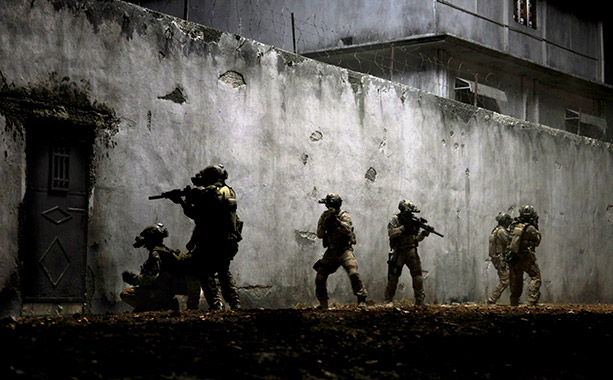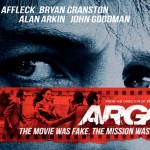My thoughts on Zero Dark Thirty resemble my thoughts on Lincoln in many respects. Both are movies where the end is never in doubt. Both attempt, without success, to tell their story in a more or less historically accurate way. Both fail to conjure up the tension and interest that their stories could have had. Zero Dark Thirty, however, does have at least one saving grace: the last forty minutes are fantastic, showing that Kathryn Bigelow is an accomplished director of action sequences (See: Hurt Locker, The).
Before the closing minutes, however, the movie is nearly perfectly summed up by a line from Roger Ebert’s review of the film: “There isn’t a whole lot of plot — basically, just that Maya thinks she is right, and she is.” Before the climactic raid on Bin Laden’s compound, I do not think you can point to a scene where the result of the scene matters. As viewers, we know that, as a historical reality, we have to get from point A to point B. Therefore, the film needs to provide something other than mere history in order to reach out and engage the viewer. Unlike Lincoln, Zero Dark Thirty does occasionally attempt this, but shoddy filmmaking undercuts the effort every time.
First off, there is the obligatory torture scenes. It takes up significant portion of the film’s first act, and at one point, I actually thought the whole movie was going to be a critique of the methods we used to track down Bin Laden. I might have liked that movie more, because Zero Dark Thirty drops the torture subplot at an arbitrary point and never really brings it up again. Maya, the main character, initially seems upset by the torture. Then, quite suddenly, she is a hardened veteran, doling it out much like a kid going at a piñata. There is no attempt to explain this transformation. One can barely even call it a transformation. One scene she seems uncomfortable, the next she doesn’t. The movie doesn’t say much about her character.
Nor does the movie say much about the torture, in general. I don’t mean that the film’s message on torture is ambivalent or nuanced. I mean the film really seems to have nothing to say. It shows you some torture. It does not approve or disapprove. It shows you the ostensible results of the torture: we found Bin Laden. The film does not approve or disapprove. Bigelow has stated that she wasn’t trying to make any political statements with her film. She just wanted to show the story as it happened. Avoiding political statements is fine, but avoiding artistic statements seems to defeat the point of making a movie in the first place. What are we supposed to be doing with this movie? Are we moved to sympathy for those who want to kill us? Are we supposed to reflect on the moral ambiguity of ends justifying means? Are we supposed to wonder how a United States agency managed to torture people for years, without anyone stopping it? It isn’t clear.
If the movie truly were a documentary that simply laid out the facts as they were, Zero Dark Thirty’s flat descriptiveness would be fine. But as a documentary, the movie would fail for different reasons. First, the movie does very little to explain exactly what happened. The scenes are so full of unexplained jargon and seemingly arbitrary jumps through time and space that it is hard to come out of it with a better understanding of the CIA’s job. One thing that does come across is the slogging, frustrating pace of the detective work. The movie deserves credit for this, but then, when your movie is very good at explicating boredom and frustration, you might wonder what is going on with it.
The second problem is that the movie’s historical account is so obviously simplified. I don’t need a Ph.D. to know that Jessica Chastain did not single-handedly find Bin Laden. She and the other main characters had signs stamped to their foreheads: “CHARACTER COMPOSITE.” If they were compelling or entertaining characters, I would understand; if it helped to more easily explain the timeline that led to Bin Laden’s death, I would also understand; but what is the point of compositing characters when the overall story arc is still impenetrable?
Zero Dark Thirty suffers from a problem that is usually found among films based on books: in trying to remain true to the “original,” the film misses much of what made the original worthwhile. Great adaptations—Blade Runner, The Maltese Falcon, L.A. Confidential—do what is necessary to make a great film, even if they have to sacrifice literal faithfulness. Sometimes that means near identical dialogue—The Maltese Falcon. Sometimes that means an entirely different narrative, that seems to just barely exist in the same universe as the original—Blade Runner. Sometimes that means taking several characters from an ultra-complicated story, and weaving them into a thematically similar but structurally simpler story—L.A. Confidential.
I don’t think Zero Dark Thirty is sure what it wants to be. It is stuck in a no-man’s land where the dates and places are the same (kind of), but the characters aren’t. The search is intended to hit an emotional chord with the audience (or is it?), but it can’t, because we are privy to outcomes that the characters aren’t. (How can I share in Maya’s frustration that the President still hasn’t ordered an invasion of Pakistani airspace when I know he is going to do so in a few minutes of movie time?)
The final sequence, in its excellence, points out what is missing in the rest of the film. An elite Navy Seal team flying futuristic, stealthy helicopters through Pakistani ravines? I have never seen such a thing before. An elite Navy Seal team crashes a helicopter for no apparent reason, and seems… kind of okay about it? Never seen that. An elite Navy Seal team uses various technologies (from explosives to the ol’ “shoot your gun through the door” trick) to invade a house, set in the middle of what looks like a suburban neighborhood? Never seen that either.
Yet even here, in the midst of some very fine filmmaking, the movie ultimately fails to do anything with its resources. The scene matter-of-factly displays the killing. Elite Navy Seals shoot men and women who move too quickly. They shoot Bin Laden, without much, if any, provocation. The movie doesn’t swell the music, and it doesn’t stop to consider what is happening. It just shows it. This works at least momentarily because these violent images are arresting. Embellishing them would only weaken them. But then… nothing. The scene is just over, the Seals leave the story, and Maya is left standing there, a blank look on her face.
Perhaps the point of the movie was that, ultimately, the search for Bin Laden, and the killing of Bin Laden, were not as important or as climactic as they were made out to be. Perhaps the movie is intending to portray the emptiness of an Ahab-like thirst for vengeance. Perhaps the blank nothingness I felt walking out of the theater was what I was supposed to feel.
Perhaps.













